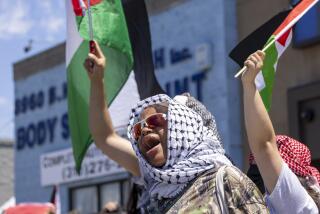Sandinistas Are Anti-Semitic, Group Charges
- Share via
Less than a month before Congress is expected to vote on a $14-million aid package to fund anti-Sandinista rebels in Nicaragua, a group of conservative Nicaraguan Jews has begun a national campaign in conjunction with rebel leaders to convince American Jews that the Sandinista government is anti-Semitic and anti-Israel.
The campaign, which began last week in Los Angeles and moved to Washington on Wednesday, is aimed at building pressure on Jewish congressmen and non-Jewish congressmen with Jewish constituents who have opposed CIA funding of the contras, as the rebels are called, according to organizers of the campaign.
The coast-to-coast campaign was started by Hal Phillips, a Burbank car dealer and Reagan Administration appointee with ambassadorial rank to a small U.S. agency called the Inter-American Foundation. The foundation helps coordinate U.S. grants to Latin America.
Phillips, who is not Jewish, said in an interview that the campaign was conceived and financed by the Working Group for Latin America, which he co-founded.
The campaign began March 4, when the Working Group arranged a press conference in Los Angeles for contras, including Adolfo Calero, who heads the largest anti-Sandinista faction.
The press conference was followed by a week of personal appearances in Los Angeles by Calero and by Nicaraguan Jews Elena Gorn, and Sarita and Oscar Kellerman. Gorn and the Kellermans on Wednesday began campaigning in Washington, both with contra leaders at press conferences and in private with congressmen, at synagogues, and with conservative groups.
The Jewish exiles steered clear of calling upon Jewish congregations to support the Reagan Administration’s appeal for CIA support for the contras. However, they said in personal interviews that they strongly support the contra effort.
The campaign revives charges first raised in 1983 that the Sandinista government forced out Nicaragua’s 50 Jews through a combination of anti-Semitic threats and confiscation of private property. It also raises anew questions about the leftist Managua government’s support of the Palestine Liberation Organization. Nicaragua has cast votes against Israel and in favor of the PLO in the United Nations.
The anti-Semitism issue has been slow to catch on in the United States, however, because there are virtually no Jews now living in Nicaragua and because delegations sent to Nicaragua to investigate the charges came back with mixed reports.
Anthony Quainton, then the U.S. ambassador to Nicaragua, reported to Washington in late 1983 that “no verifiable evidence” had been found to support claims of anti-Semitic policies by the leftist government.
Many of the roughly 30 Jewish congressmen have been outspoken critics of the Reagan Administration’s support of the anti-Sandinista forces. Congress voted last year to cut off CIA aid to the rebels, who have been accused of a variety of human rights abuses. A vote is expected in April to determine whether to restore $14 million in CIA aid to the rebels.
The Anti-Defamation League of B’nai B’rith takes the stand that Nicaragua’s small Jewish community was persecuted by the Sandinistas. But the ADL, which has acted as an intermediary between the Jewish exiles and the Sandinista government, has stated that the anti-Semitism is unofficial and stems from lingering resentment over Israel’s supplying of arms to the army of former President Anastasio Somoza.
More to Read
Sign up for Essential California
The most important California stories and recommendations in your inbox every morning.
You may occasionally receive promotional content from the Los Angeles Times.













